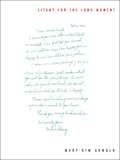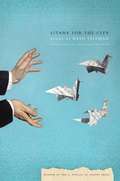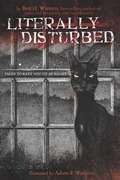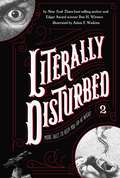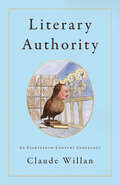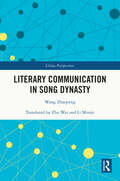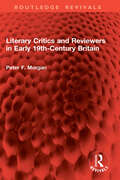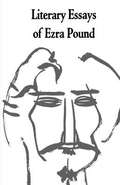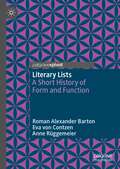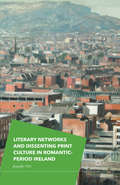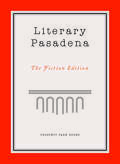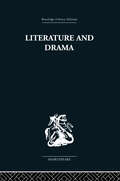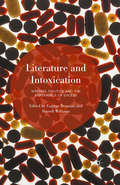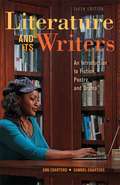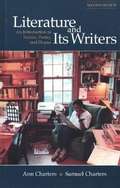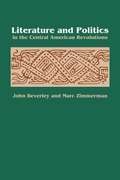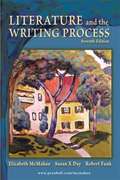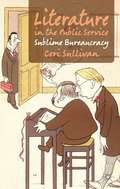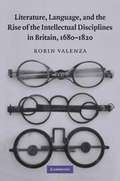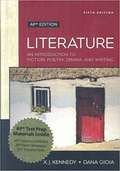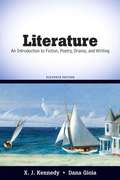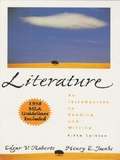- Table View
- List View
Litany For The Long Moment
by Mary-Kim ArnoldThe orphan at the center of LITANY FOR THE LONG MOMENT is without homeland and without language. In three linked lyric essays, Arnold attempts to claim her own linguistic, cultural, and aesthetic lineage. Born in Korea and adopted to the US as a child, she explores the interconnectedness of language and identity through the lens of migration and cultural rupture. Invoking artists, writers, and thinkers—Theresa Hak Kyung Cha, Francesca Woodman, Susan Sontag, among others—LITANY FOR THE LONG MOMENT interweaves personal documents, images, and critical texts as a means to examine loss and longing.
Litany for the City
by Jane Hirshfield Ryan TeitmanSelected by Jane Hirshfield from over six hundred manuscripts, Litany for the City is the winner of the tenth annual A. Poulin, Jr. Poetry Prize. Of Litany for the City, Hirshfield writes, "This book carries both startling imaginative freedoms and the impulsion of a person navigating the terrain of his life by means of the star-chart and sextant of poems--a winning combination, for me."Ryan Teitman is a Wallace Stegner Fellow in Poetry at Stanford University. He holds an MA and MFA from Indiana University. He currently lives in Berkeley, California.
Litany for the City
by Ryan TeitmanSelected by Jane Hirshfield from over six hundred manuscripts, Litany for the City is the winner of the tenth annual A. Poulin, Jr. Poetry Prize. Of Litany for the City, Hirshfield writes, "This book carries both startling imaginative freedoms and the impulsion of a person navigating the terrain of his life by means of the star-chart and sextant of poems--a winning combination, for me."Ryan Teitman is a Wallace Stegner Fellow in Poetry at Stanford University. He holds an MA and MFA from Indiana University. He currently lives in Berkeley, California.
Literally Disturbed
by Ben H. Winters Adam F. WatkinsCome on up to the attic Come up if you dare Climb up the rickety ladder-- Come up and see what's there... Ben H. Winters brings the fear factor to this collection of thirty spooktastic rhyming stories about witches, zombies, vampires and more! Featuring eerie illustrations by Adam F. Watkins, this book is perfect for nights around the campfire and slumber party ghost stories. Be sure to keep a flashlight close!
Literally Disturbed #2
by Ben H. Winters Adam F. WatkinsMore scary stories from Edgar Award winner and New York Times bestselling author Ben H. Winters!Chased by wolves,no escape.Monsters screeching,changing shape.Dusty tombstones,bones beneath.Swooping dragons,giant teeth--all things awful, all things wrong,all these nightmares, all night long!Ben H. Winters continues to scare readers in this collection of 30 creepy rhyming stories about the things that haunt your nightmares! Featuring more chilling illustrations by Adam F. Watkins, this book will keep readers awake all night long."Winters gives kids just the right amount of scary (i.e., not too scary) for read-alouds at a sleepover or around the campfire--or even solo under the covers with a flashlight." --Booklist, on Literally Disturbed: Tales to Keep You Up at Night
Literary Authority: An Eighteenth-Century Genealogy
by Claude WillanThis book is the cultural history of an idea which now seems so self-evident as barely to be worth stating: through writing imaginative literature, an author can accrue significant and lasting economic and cultural power. We take for granted, now, that authority dwells in literature and in being its author. This state of affairs was not naturally occurring, but deliberately invented. This book tells the story of that invention. The story's central figures are Alexander Pope and Samuel Johnson. But its narrative begins in the 1680s, with the last gasp of the bond linking literary to political authority. While Jacobite poets celebrated (and mourned) the Stuart dynasty, Whig writers traced the philosophical and aesthetic consequences of the accession of William of Orange. Both groups left behind sets of literary devices ready-made to confer and validate authority. Claude Willan challenges the continued reign of the "Scriblerian" model of the period and shows how that reign was engineered. In so doing he historicizes the relationship between "good" and "bad" writing, and suggests how we might think about literature and beauty had Pope and Johnson not taken literary authority for themselves. What might literature have looked like, and what could we use it for, he provocatively asks.
Literary Communication in Song Dynasty (ISSN)
by Wang ZhaopengBased on first-hand historical materials, this book explores the various aspects of literary communication during the Song Dynasty in China.The book investigates the single-channel dissemination of poetry and ci works, the dissemination of literary collections, the dissemination through wall inscriptions, the oral dissemination of Song ci, the remuneration and commercialization of literature in the Song Dynasty, the paths to fame for Song writers, the non-literary factors in the dissemination of literature and the dissemination of literary works through paintings and songs. The author provides insights into the six major questions in the study of literary communication: Who disseminates, where, how, what, to whom and the effects of dissemination. The author also seeks to provide detailed answers to the following questions. What was the role of female singers in both domestic and official entertainment? What were the costs and prices of the books? Who paid the authors? What methods did writers use to gain fame and social recognition?This work will be essential reading for scholars and students of Chinese studies, communication studies and media and cultural studies.
Literary Critics and Reviewers in Early 19th-Century Britain (Routledge Revivals)
by Peter F. MorganThe nineteenth century saw the growth of several major magazines devoted to the reviewing of contemporary literature. The new popular importance that literature was beginning to enjoy—in particular, the novel form—inevitably led to a change in the way literature was discussed and perceived.Three of the major reviews of the period that reflected this new outlook are discussed in Literary Critics and Reviewers in Early 19th-Century Britain (originally published in 1983)—the Whig Edinburgh Review, founded in 1804; the Quarterly Review, the government counterblast begun five years later; and the Westminster Review, the radical paper first instituted in 1824. Each of these received contributions from major writers themselves such as Carlyle, Macaulay, Scott, Southey, and Mill. These, together with Jeffrey, Lockhart, and Croker form the main subject of this book. By examining the work of each writer, the author conveys a sense of the richness and variety of the field.The criticism examined is important intrinsically, but also it is seen in the context of the philosophy and personality of the individual critic, and his important role, in the review especially, as mediating between literature and the reading public.
Literary Essays of Ezra Pound
by Ezra PoundEdited and with an introduction by T. S. Eliot. The 33 essays contained in this collection are separated into three categories: The Art of Poetry, The Tradition, and contemporaries. These essays showcase the range of Pound's interests, with topics ranging from modernist poetry to Japanese iconography, troubadour songs, and much more.
Literary Lists: A Short History of Form and Function
by Eva von Contzen Roman Alexander Barton Anne RüggemeierThis book provides a concise introduction to lists in literature from the early modern period to the twenty-first century. Tracing the changing functions of the literary list across time, it offers a broad range of case studies which situate selected enumerations in their respective contexts and demonstrate the versatility and creative potential of the list form. Starting with a review of previous research on the literary list, the book discusses four main constellations of enumeration: series and the great chain of being; itemization and enumerative realism; ‘letteracettera’ and experimental list-making; ‘white noise’ and creative exploits of enumeration between formal playfulness and existential exploration. The epilogue offers an analytical toolkit for the study of literary lists based on rhetorical theory.
Literary Networks and Dissenting Print Culture in Romantic-Period Ireland
by Jennifer OrrLiterary Networks and Dissenting Irish Print Culture examines the origins of Irish labouring-class poetry produced in the liminal space of revolutionary Ulster (1790-1815), where religious dissent fostered a unique and distinctive cultural identity.
Literary Pasadena
by David Ebershoff Jervey Tervalon Michelle Huneven Victoria Patterson Patricia O'SullivanThe historic, handsome city in the shadow of Los Angeles has been a creative hotbed since the Arroyo Arts & Crafts scene of the early twentieth century. This literary journal gathers short fiction by such Pasadena-area writers as Michelle Huneven (Blame), Victoria Patterson (This Vacant Paradise), Jervey Tervalon (Understand This), Naomi Hirahara (Snakeskin Shamisen), Lian Dolan (Helen of Pasadena), Ron Koertge (The Arizona Kid), Dianne Emley (the Nan Vining mysteries), and Jim Krusoe (Parsifal).Produced as a companion to LitFest Pasadena (May 2013), Literary Pasadena: The Fiction Edition is the first in an annual series that will move on to include editions in poetry, essays, humor, and more.
Literary Works of Bharathidaasan: Azhagin Cirippu
by Kanakasubbaratnam Alias BharathidasanPoet Bharathidasan’s style captivates the reader as he describes various aspects of nature.The rich poetry yet quite understandable by one and all is what makes Bharathidassa's poems so well loved.
Literature and Drama: with special reference to Shakespeare and his contemporaries
by Stanley WellsFirst published in 1970. This book examines the areas of plays that are dependent upon the art of the theatre and the fluidity of interpretation to which this gives rise. It discusses the printing of plays and the limited attempts that have have been made to convey theatrical experience, taking as a particular example a masque by Ben Jonson. Finally, some of the problems created by the instability of theatrical art
Literature and Intoxication: Writing, Politics and the Experience of Excess
by Eugene Brennan Russell WilliamsThis collection traces the intersection between writing and intoxication, from the literary to the theoretical, exploring a diversity of experiences of excess. Comprising a variety of perspectives, this book offers unique insights into how politics and literature have been shaped by states of intoxication.
Literature and Its Writers: A Compact Introduction to Fiction, Poetry, and Drama
by Ann Charters Samuel ChartersLiterature is a conversation -- between writers and other writers, and between writers and readers. In Literature and Its Writers, Ann and Samuel Charters complement a rich and varied selection of stories, poems, and plays with an unparalleled array of commentaries about that literature by the writers themselves. Such "writer talk" inspires students to respond as it models ways for them to enter the conversation. In the sixth edition, the Charters continue to entice students to join the conversation, with adventurous and intriguing new literary works, more detailed coverage of literary elements, and more help with reading and writing.
Literature and Its Writers: An Introduction to Fiction, Poetry, and Drama
by Ann Charters Samuel ChartersA compilation of fiction, poetry and drama. The book discusses these works and aspects of reading and writing.
Literature and Politics in the Central American Revolutions
by John Beverley Marc Zimmerman"This book began in what seemed like a counterfactual intuition . . . that what had been happening in Nicaraguan poetry was essential to the victory of the Nicaraguan Revolution," write John Beverley and Marc Zimmerman. "In our own postmodern North American culture, we are long past thinking of literature as mattering much at all in the 'real' world, so how could this be?" This study sets out to answer that question by showing how literature has been an agent of the revolutionary process in Nicaragua, El Salvador, and Guatemala. The book begins by discussing theory about the relationship between literature, ideology, and politics, and charts the development of a regional system of political poetry beginning in the late nineteenth century and culminating in late twentieth-century writers. In this context, Ernesto Cardenal of Nicaragua, Roque Dalton of El Salvador, and Otto René Castillo of Guatemala are among the poets who receive detailed attention. "This book began in what seemed like a counterfactual intuition . . . That what had been happening in Nicaraguan poetry was essential to the victory of the Nicaraguan Revolution," write John Beverley and Marc Zimmerman. "In our own postmodern North American culture, we are long past thinking of literature as mattering much at all in the "real" world, so how could this be?" This study sets out to answer that question by showing how literature has been an agent of the revolutionary process in Nicaragua, El Salvador, and Guatemala. The book begins by discussing theory about the relationship between literature, ideology, and politics, and charts the development of a regional system of political poetry beginning in the late nineteenth century and culminating in late twentieth-century writers. In this context, Ernesto Cardenal of Nicaragua, Roque Dalton of El Salvador, and Otto René Castillo of Guatemala are among the poets who receive detailed attention.
Literature and the Writing Process
by Elizabeth Mcmahan Robert Funk Susan X. DayA literature anthology, rhetoric, and handbook in one. Every chapter of this anthology includes coverage of the writing process to help students write more successfully about literature. The process-oriented instruction shows students how to use writing as a way of studying literature and provides students with the tools to analyze literature on their own. New to this edition: New photographs and images chosen to enhance understanding and appreciation of literature Expanded, updated discussion of researched writing (Chapter 17) Further instruction on the elements of argument and arguing an interpretation (Chapter 2) A new casebook on the poetry and prose of Langston Hughes
Literature in the Public Service
by Ceri SullivanHistorians and sociologists have been consistently - albeit gloomily - enthralled by Max Weber's model of the inevitable rise of the neurocrat. However, literary critics positively boast that writers, like academics, cannot 'do admin'. While Weber's thesis about the rise of the entrepreneur all fire, individuality, thrust is in tune with what we think literature is about, his thesis about the rise of the bureaucrat is not. Yet 'creative bureaucracy' is not only a euphemism for bending the rules. Literature in the Public Service shows how the public service makes its workers original, taking them beyond an individuated point of view to imagine the perfect public system. Creativity theorists too have swapped the model of solitary inspiration for a managed creative environment. John Milton, Anthony Trollope, and David Hare are examples of how authors work in and write about the public service, during its crisis moments. "
Literature, Language, and the Rise of the Intellectual Disciplines in Britain, 1680–1820
by Robin ValenzaThe current divide between the sciences and the humanities, which often seem to speak entirely different languages, has its roots in the way intellectual disciplines developed in the long eighteenth century. As various fields of study became defined and to some degree professionalized, their ways of communicating evolved into an increasingly specialist vocabulary. Chemists, physicists, philosophers, and poets argued about whether their discourses should become more and more specialized, or whether they should aim to remain intelligible to the layperson. In this interdisciplinary study, Robin Valenza shows how Isaac Newton, Samuel Johnson, David Hume, Adam Smith, Samuel Taylor Coleridge and William Wordsworth invented new intellectual languages. By offering a much-needed new account of the rise of the modern disciplines, Robin Valenza shows why the sciences and humanities diverged so strongly, and argues that literature has a special role in navigating between the languages of different areas of thought.
Literature: An Introduction To Fiction, Poetry, And Drama
by X. J. Kennedy Dana Gioia"Literature, 9/e," the most popular introduction of its kind, is organized into three genresFiction, Poetry, and Drama. As in past editions, the authors' collective poetic voice brings personal warmth and a human perspective to the discussion of literature, adding to students' interest in the readings. An introduction to a balance of contemporary and classic stories, poems, and plays. Casebooks offer in-depth look at an author or clusters of works, for example " Latin American Poetry. " Authors Joe Kennedy and Dana Gioia provide inviting and illuminating introductions to the authors included and to the elements of literature. Coverage of writing about literature is also included. For those interested in literature.
Literature: An Introduction to Fiction, Poetry, Drama, and Writing
by X. J. Kennedy Dana GioiaLiterature: An Introduction to Fiction, Poetry, Drama, and Writing, Fifth AP Edition by X. J. Kennedy and Dana Gioia.
Literature: An Introduction to Fiction, Poetry, Drama, and Writing (11th Edition)
by X. J. Kennedy Dana GioiaThis Interactive Edition of Literature, Eleventh Edition is really four interlocking volumes sharing one cover. Each of the first three sections is devoted to one of the major literary forms--fiction, poetry, and drama. The fourth section is a comprehensive introduction to critical writing.
Literature: An Introduction to Reading and Writing, Fifth Edition
by Edgar V. Roberts Henry E. JacobsThis edition emphasizes research writing and critical approaches to literature. Including 60 stories, 388 poems, and 17 dramatic works, this book offers a balanced collection of works by male and female authors of different ethnic, political, economic, cultural, and religious backgrounds. In addition to carefully chosen literary selections, each chapter contains detailed information on and sample essays for writing about literature.
